Religion: Religious Leaders Post-1900
Ajahn Mun (1870-1949)
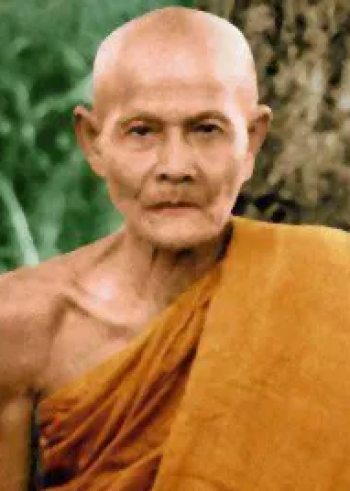
Religion and Branch: Buddhism (Theravada)
Title: Monk, Meditation Master
Ajahn Mun Bhuridatta was one of the most influential figures in modern Thai Buddhism, particularly within the Thai Forest Tradition of Theravada Buddhism. Together with his teacher Ajahn Sao Kantasīlo, he revitalized the Forest Tradition—a monastic practice that emphasizes meditative practice, strict adherence to the monastic code of discipline, and living in secluded forest areas.
Mun placed great importance on meditation, specifically on the development of insight. His teachings stressed the direct experience of the Dhamma, emphasizing personal experience over scriptural study. True to the Forest Tradition, he spent many years wandering through the forests of Thailand, Laos, and other regions, practicing meditation in solitude and facing the challenges of the wilderness.
Mun left behind a lineage of accomplished disciples, many of whom became revered meditation masters in their own right. These disciples further spread his teachings and established their own monastic communities. Although Mun did not leave extensive written teachings, his disciples recorded his teachings, biography, and many Dhamma talks, which have been translated into various languages and are studied worldwide.
Mun's rigorous approach to practice and his emphasis on direct realization of the Dhamma helped revive serious monastic practice in Thailand. He stands as a monumental figure in Thailand's religious history, particularly in rekindling the Forest Tradition of monasticism and meditation. His influence persists today through the many monasteries of this tradition, both in Thailand and abroad. Today, the Forest Tradition, influenced heavily by Mun's approach, has spread globally and has attracted many practitioners from around the world.
Luang Pu Sodh Candasaro (1884-1959)
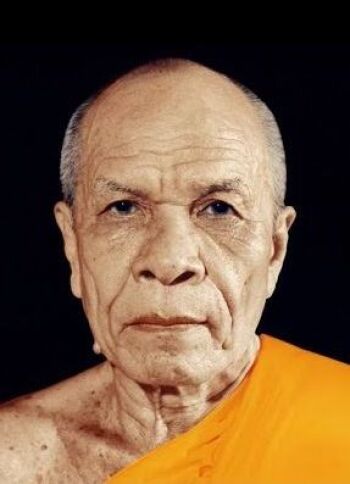
Religion and Branch: Buddhism (Theravada)
Title: Monk, Abbot, Founder of Thai Dhammakāya School
Luang Pu Sodh Candasaro is a highly respected monk in Thai Buddhism, particularly known for his meditation teachings and the development of a prominent Buddhist institution. He served as the abbot of Wat Paknam Bhasicharoen from 1916 until his death in 1959.
Candasaro is credited with reviving the Dhammakaya meditation method, a form of meditation that focuses on visualizing a bright object or sphere at the center of the body. This technique, rooted in ancient Theravada traditions, became a significant movement in Thai Buddhism in the 20th century and continues to have many adherents today.
Under Candasaro's leadership, Wat Paknam Bhasicharoen, located in Bangkok, became a prominent center for Buddhist study and meditation. The temple attracted many practitioners from across Thailand and beyond, keen to learn the Dhammakaya meditation method.
Candasaro's teachings emphasized both scholarly understanding and direct meditative experience. His influence wasn't just limited to monastics; laypeople also became avid practitioners of the Dhammakaya method under his guidance.
Candasaro played a pivotal role in the modern Thai Buddhist landscape by reviving and popularizing the Dhammakaya meditation method, which has since become one of Thailand's most prominent and influential Buddhist movements. After his passing, the Dhammakaya tradition continued to grow, culminating in the establishment of the vast Wat Phra Dhammakaya temple complex in the 1970s. While Wat Phra Dhammakaya and its leaders have sometimes been the subject of controversy in recent years, its roots in the teachings of Luang Pu Sodh remain a testament to his significant impact on Thai Buddhism.
Luang Pu Waen Suciṇṇo (1887-1985)
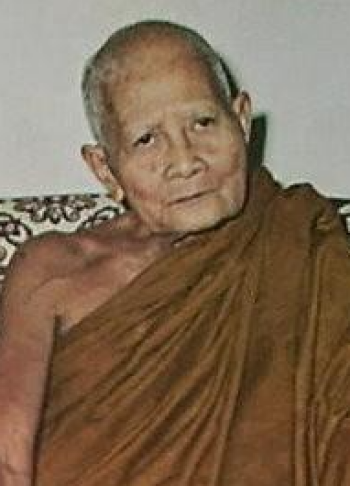
Religion and Branch: Buddhism (Theravada)
Title: Monk
Luang Pu Waen Suciṇṇo was a highly revered monk in the Thai Theravada Buddhist tradition, especially within the Thai Forest Tradition. It is a lineage of Theravada Buddhist monasticism that emphasizes a strict and ascetic lifestyle, meditative practice, and close adherence to the Vinaya (the monastic code).
Embodying the ideals of the Forest Tradition, Suciṇṇo led a life of simplicity and asceticism, often dwelling in secluded forest areas, away from the distractions of urban life. He was renowned as a meditation master and was sought after by many for his guidance and teachings on Dhamma and meditation practice. His emphasis on direct experience and rigorous practice made him a central figure in the Thai monastic community.
Throughout his life, Suciṇṇo trained numerous disciples, many of whom went on to become respected meditation masters in their own right. His teachings, characterized by clarity and directness, continue to inspire many in the Buddhist community.
After Suciṇṇo's passing in 1985, it was reported that relics (crystalline formations believed by devotees to be a sign of a monk's spiritual attainments) were found among his cremation ashes, further solidifying his status as a revered and accomplished master in the eyes of many Thai Buddhists. He is remembered as one of the great meditation masters of the 20th century in Thailand, with his teachings and practices continuing to inspire and guide Buddhist practitioners both within and outside Thailand.
Buddhadasa Bhikkhu (1906-1993)
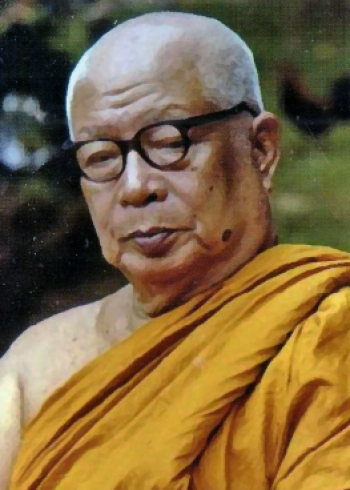
Religion and Branch: Buddhism (Theravada)
Title: Monk
Buddhadasa Bhikkhu, whose given name was Nguam Panitch, was an influential Thai Theravada Buddhist monk and a prolific thinker. Born in 1906 in Chaiya, Southern Thailand, he is best known for his innovative interpretations of Buddhist teachings and for his efforts to promote a form of Buddhism that was both consonant with modern scientific thinking and social concerns.
In 1932, Buddhadasa founded Wat Suan Mokkh (the "Garden of Liberation"), a forest monastery in Chaiya, where he taught a form of Buddhism that sought to return to its original principles, as laid out in the Pali Canon. His teachings had a considerable impact on many Thai intellectuals and played a role in the development of socially engaged Buddhism in other parts of Asia. His ideas were sometimes controversial among the more conservative religious authorities in Thailand, but he had a substantial following among both laypeople and monks.
Buddhadasa sought to strip away the layers of ritual and supernatural beliefs that had been added to Buddhism over the centuries, emphasizing instead its core teachings. He believed that much of traditional Thai Buddhism had been corrupted by Hindu and animistic influences and needed reform.
Buddhadasa introduced the concept of Dhammic socialism, advocating for a society where individuals work together in harmony and avoid the extremes of both individualism and collectivism. This theory aimed to blend Buddhist and socialist principles to benefit society as a whole. He also was known for promoting interfaith dialogue and believed that all religions teach essentially the same core truths. He often highlighted the common ground between different religious traditions.
Even after his death in 1993, Buddhadasa's teachings continue to influence Thai Buddhism and the broader global Buddhist community. His writings and recorded talks remain widely read and studied. He was a pivotal figure in 20th-century Thai Buddhism, pushing for a return to the religion's foundational teachings while also integrating contemporary ideas and promoting interreligious understanding.
Luang Por Teean Cittasubho (1911-1988)
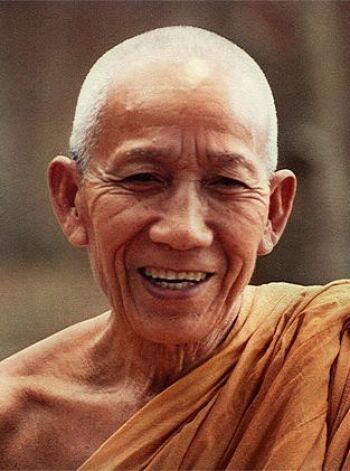
Religion and Branch: Buddhism (Theravada)
Title: Monk
Luang Por Teean Cittasubho was a renowned Buddhist monk known for his unique meditation techniques and contributions to the Thai Forest Tradition, a monastic movement within Thai Theravada Buddhism that emphasizes strict adherence to the Vinaya (monastic code) and intensive meditation practices. Born as Pann Intapew in the northeastern part of Thailand, he began practicing meditation in his early years and later pursued monkhood, where he delved deeper into his meditation practices.
Cittasubho developed a distinctive method of meditation known as Mahasati Meditation or Dynamic Meditation. This technique involves specific hand movements to cultivate mindfulness and awareness of the present moment.
Unlike more traditional, static meditation practices that emphasize seated concentration, Cittasubho's method was movement-based, focusing on developing continuous awareness in everyday life. His teachings stressed the universality of the Dhamma, which can be accessed and understood by anyone, regardless of their background or education.
Cittasubho was a significant figure in modern Thai Buddhism, particularly known for his unique approach to meditation that emphasizes constant mindfulness in day-to-day activities. His teachings and meditation techniques continue to influence many practitioners in Thailand and beyond. Several meditation centers, both within Thailand and internationally, continue to teach his unique method of dynamic meditation.
Ajahn Maha Bua (1913-2011)
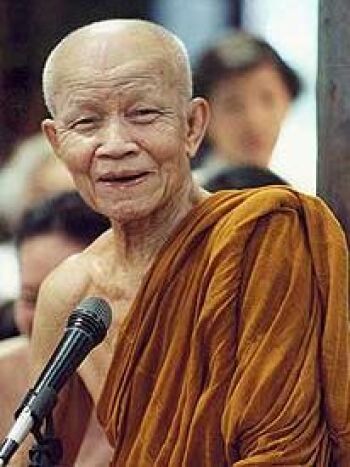
Religion and Branch: Buddhism (Theravada)
Title: Monk, Master in Thai Forest Tradition
Ajahn Maha Bua, also commonly known as Luang Ta Maha Bua, was one of Thailand's most revered and influential Buddhist monks in the Thai Forest Tradition of Theravada Buddhism. He was one of the foremost disciples of the renowned meditation master Ajahn Mun Bhuridatta. After Bhuridatta's death, Bua carried on his teacher's lineage, becoming one of the most prominent figures in the Thai Forest Tradition.
Bua established Wat Pa Baan Taad forest monastery in Udon Thani Province, which became a center for meditation and Dhamma practice, drawing both Thai and international practitioners. Known for his direct and often fiery teaching style, Bua wrote and gave discourses on Dhamma, meditation, and the monastic life. Many of these teachings have been translated into various languages, making his wisdom accessible to a global audience.
In addition to his spiritual teachings, Bua was known for his significant charitable efforts. Notably, during Thailand's economic crisis in the late 1990s, he spearheaded a national fundraising campaign, resulting in billions of baht being donated to support the Thai economy. He also founded the Help Thai Nation Project, a charitable effort dedicated to helping the Thai economy.
Bua's dedication to the monastic life, rigorous meditation practice, and profound insights into the Dhamma have made him a source of inspiration for countless Buddhists around the world. He was a pillar of the Thai Forest Tradition and a central figure in 20th-century Thai Buddhism. His teachings, charitable works, and dedication to the monastic life have left a lasting impact on Thai society and the broader Buddhist world.
Somdet Phra Nyanasamvara (1913-2013)
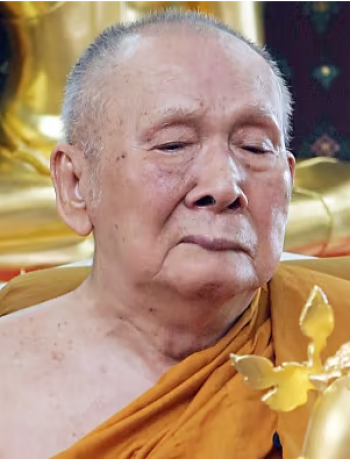
Religion and Branch: Buddhism (Theravada)
Title: 19th Supreme Patriarch of Thailand
Somdet Phra Nyanasamvara was a significant figure in the religious landscape of Thailand. He was the 19th supreme patriarch of Thailand, serving in this esteemed position from 1989 until his death in 2013. In this role, he was the head of the order of Theravada Buddhist monks in Thailand.
Throughout his tenure, Nyanasamvara worked tirelessly to promote Buddhism, not only in Thailand but also abroad. He supported various initiatives to spread Buddhist teachings and values. He played a crucial role in the education of monks, emphasizing the importance of monastic education and the study of the Pali language, which is the liturgical language of Theravada Buddhism.
Supreme patriarch for more than two decades, Nyanasamvara has been one of the longest-serving heads of the Thai Sangha (the Buddhist monastic community). As a spiritual leader, he was revered and respected by millions of Buddhists in Thailand and around the world. His teachings and guidance have left a lasting impact on the Theravada Buddhist community.
Ajahn Chah (1918-1992)
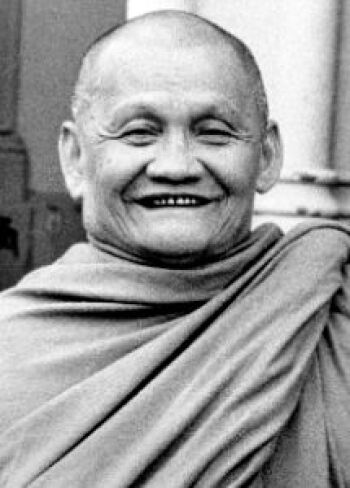
Religion and Branch: Buddhism (Theravada)
Title: Monk
Ajahn Chah is one of the most influential monks in the Thai Forest Tradition of Theravada Buddhism, which emphasizes meditative practice, strict adherence to the Vinaya (monastic rules), and simplicity. In 1954, he founded Wat Nong Pah Pong in Ubon Ratchathani Province. This forest monastery became a training center for monks, nuns, and laypeople from around the world.
Known for his practical and direct teaching style, Chah used simple yet profound examples to convey the teachings of the Buddha. He emphasized the impermanence of life and the importance of meditation. Chah's teachings attracted many Western seekers. As a result, several of his Western disciples, such as Ajahn Sumedho and Ajahn Brahm, have since established monasteries in the West, notably in the United Kingdom, Australia, and the United States, spreading the teachings of the Thai Forest Tradition globally.
Chah's teachings continue to inspire Buddhists worldwide. Many of his talks have been translated into various languages, making them accessible to a global audience. He is a cornerstone figure in modern Theravada Buddhism, especially within the Thai Forest Tradition. His teachings and the monastic lineage he helped establish have had a profound impact on the spread and understanding of Theravada Buddhism both in Thailand and internationally.
Luang Phor Viriyang Sirintharo (1920-2020)
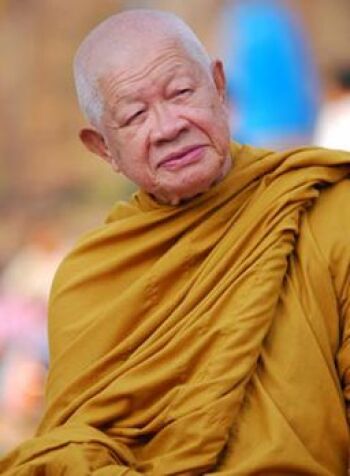
Religion and Branch: Buddhism (Theravada)
Title: Monk, Meditation Master, Patriarch of Dhammayuttika Nikaya Order in Canada
Luang Phor Viriyang Sirintharo was a highly revered monk and spiritual teacher in Thailand. His contributions to Buddhism and Thai society have made him one of the most respected figures in the country. He was ordained as a monk for more than eight decades, making him one of the longest-serving monks in Thai history.
Sirintharo was considered a master of meditation. He developed a unique meditation technique called "Mindfulness and Dynamic Meditation." This method is taught in his institutes and is known for its practical approach, which can be applied in daily life. Sirintharo founded the Willpower Institute, which focuses on teaching meditation techniques. The institute has multiple branches, not just in Thailand but also in North America, showcasing its international reach.
Throughout his life, Sirintharo was involved in various charitable projects. He was known for his commitment to helping the underprivileged, supporting educational endeavors, and other social welfare activities. He also authored several books on Buddhism and meditation, further spreading his teachings and insights. His works are widely read in Thailand and among Thai Buddhist communities abroad.
Due to his immense contributions to Buddhism and Thai society, Sirintharo received numerous accolades and recognitions, both from the Thai government and international organizations. He was a monumental figure in Thailand's religious landscape, particularly for his teachings on meditation, his charitable endeavors, and his role as a spiritual guide for countless people. He left a lasting legacy that continues to influence Thai Buddhism and its adherents.
P. A. Payutto (1938 to Present)
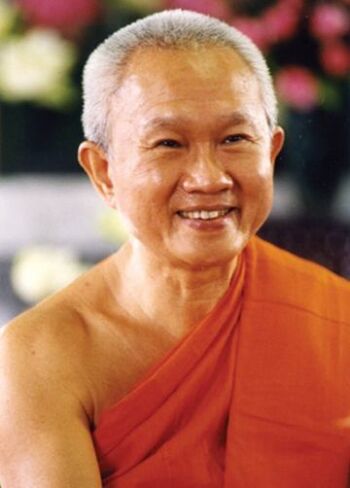
Religion and Branch: Buddhism (Theravada)
Title: Scholar, Writer
P. A. Payutto is a distinguished figure in the religious landscape of Thailand. Celebrated as one of the country's foremost Theravada Buddhist scholars, he is well-regarded for his deep understanding of the Buddhist scriptures and his ability to relate them to contemporary issues.
Payutto has written extensively, offering modern interpretations of Buddhist teachings that are both applicable and relatable to contemporary life. His works bridge traditional Buddhist teachings with modern societal challenges. He emphasizes the role of Buddhist ethics in modern society and advocates for a moral and ethical foundation in various facets of life, including economics and education.
Payutto has played a pivotal role in Dhamma education in Thailand, contributing to curriculum development and promoting a deeper understanding of Buddhist principles. In recognition of his significant contributions to Buddhist scholarship and education, he has received numerous awards, both nationally and internationally.
Payutto is a central figure in modern Thai Buddhism, known for his scholarly depth and efforts to contextualize Buddhist teachings for contemporary society.
Phra Payom Kalayano (Unknown to Present)
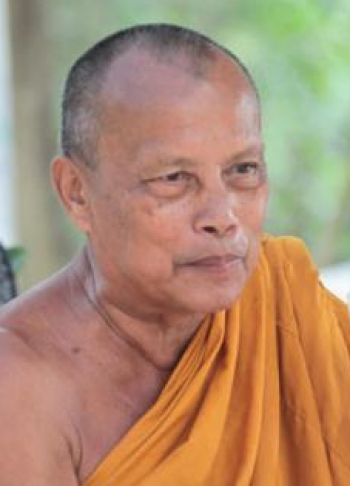
Religion and Branch: Buddhism
Title: Monk, Abbot of Wat Suan Kaew
Phra Payom Kalayano is a well-known contemporary Thai Buddhist monk. He has gained recognition for his teachings, social work, and active role in Thai society.
Kalayano is best known as the abbot of Wat Suan Kaew in Nonthaburi, near Bangkok. Also known as the Temple of the Glass Lotus, it is not just a place of worship but also a community center. Under Kalayano's leadership, it has been transformed into a hub for social activities and services.
Kalayano has initiated several humanitarian projects at Wat Suan Kaew, including a home for the elderly, orphanage, and rehabilitation programs for drug addicts. In addition, there's a project within the temple grounds where people can donate used items, and those in need can take them for free. This initiative, inspired by Kalayano, reflects Buddhist principles of mindful consumption and generosity.
Kalayano's sermons often touch upon contemporary issues, making Buddhism relevant and accessible to modern-day Thais. Temple of the Glass Lotus has become a space where people can not only learn about Dhamma but also engage in discussions about current societal challenges.
Kalayano's innovative approaches to teaching Buddhism and his active involvement in community welfare have made Wat Suan Kaew one of the unique temples in Thailand. It’s a blend of traditional monastic life, social welfare, and modern-day relevance.
Luang Por Dhammajayo (1944 to Present)
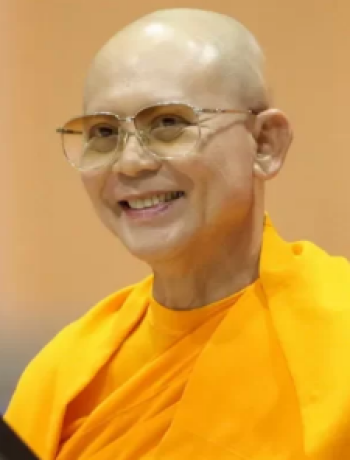
Religion and Branch: Buddhism (Theravada)
Title: Monk, Honorary Abbot
Luang Por Dhammajayo, born Chaiyaboon Sutthiphon, is a prominent and at times controversial figure in modern Thai Buddhism. He is best known as the co-founder and former abbot of Wat Phra Dhammakaya, one of the largest and most influential Buddhist temples in Thailand.
Founded in the 1970s, Wat Phra Dhammakaya is known for its distinctive architecture and massive gatherings. Under Dhammajayo's guidance, the temple popularized the Dhammakaya meditation method, which is said to be a revival of ancient Buddhist meditation techniques. The method focuses on visualizing a bright object or sphere at the center of the body. The temple has established branches in several countries, spreading its teachings and meditation method globally. This global reach has made it one of the most internationally recognized Thai Buddhist movements.
Dhammajayo's tenure as the temple's leader has not been without controversy. The temple has been criticized for its fundraising methods, and Luang Por Dhammajayo himself has faced legal challenges related to alleged financial misconduct, though he has denied any wrongdoing. The temple and its leaders have repeatedly asserted that such accusations are based on misunderstandings or are politically motivated.
In the early 2000s, facing controversies, Dhammajayo resigned from his position as the abbot of Wat Phra Dhammakaya but remained an influential figure within the temple's community. He remains a central figure in contemporary Thai Buddhism due to his role in founding and expanding Wat Phra Dhammakaya and promoting the Dhammakaya meditation method, though his leadership has also been accompanied by controversies.
Copyright © 1993—2025 World Trade Press. All rights reserved.

 Thailand
Thailand